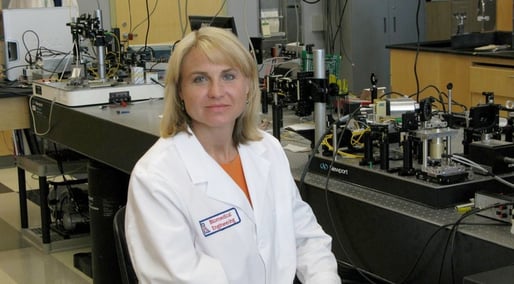 (Dr. Barton, researcher at the University of Arizona. Photo courtesy of U of A)
(Dr. Barton, researcher at the University of Arizona. Photo courtesy of U of A)
The National Cancer Institute is funding a million dollar study at the University of Arizona to help detect ovarian cancer sooner. It is hoped this project will lead to the first effective screening test for a disease that kills 14,000 women a year and often gives little to no warning of its presence until it’s too late.
Read More
Tags:
University of Arizona,
University of Arizona Tucson Research,
Arizona,
UAZ,
Biotechnology Vendor Fair,
Research Funding,
Tucson,
University of Arizona Tucson,
UA,
ovarian cancer,
2016,
cancer reserach,
Dr. Jennifer Barton,
Optical imaging technology
 The time between a patient being admitted to the hospital with an infection and the doctor making an accurate diagnosis needs to be quick so the proper treatment can be prescribed. Sometimes, however, the time between admission and diagnosis can take too long, leading to the infection spreading and causing more damage.
The time between a patient being admitted to the hospital with an infection and the doctor making an accurate diagnosis needs to be quick so the proper treatment can be prescribed. Sometimes, however, the time between admission and diagnosis can take too long, leading to the infection spreading and causing more damage.
Read More
Tags:
Southwest,
2015,
BioResearch Product Faire Front Line Event,
AZ,
UAZ,
Biotechnology,
Tucson,
University of Arizona Tucson,
BioResearch Product Faire
University of Arizona, Tucson doctoral student Sara Parker, alongside her adviser Sourav Ghosh (assistant professor of cellular and molecular medicine), have shed light on an unknown mechanism responsible for establishing polarity in developing nerve cells. This research, receiving life science funding from the National Institute of Health and Achievement Rewards for College Scientists Foundation, Inc. (awarded to Sara Parker), is allowing these scientists to understand how nerve cells make connections in the body.
Tags:
2014,
2013,
University of Arizona,
Southwest,
Alzheimer's Research,
Arizona,
AZ,
UAZ,
BioResearch Product Faire Event,
Front Line event,
Front Line,
Tucson,
University of Arizona Tucson
A University of Arizona, Tucson researcher, Charles Raison, MD, recently received a 2013 IMHR Pilot Grant of $20,000 from the Institute for Mental Health Research to study the effects of whole body hyperthermia as an antidepressant. Dr. Raison is an associate professor of psychiatry in the College of Medicine and an associate professor in the College of Agriculture and Life Sciences, as well. His study is titled, “Antidepressant Effects of Whole Body Hyperthermia (WBH).”
Tags:
2014,
2013,
University of Arizona,
Southwest,
Arizona,
AZ,
UAZ,
BioResearch Product Faire Event,
Tucson,
NIH funding,
NIH grant,
University of Arizona Tucson,
NIH award
Tags:
2014,
2013,
University of Arizona,
Southwest,
Arizona,
AZ,
UAZ,
BioResearch Product Faire Event,
Front Line,
Tucson,
NIH funding,
NIH grant,
University of Arizona Tucson,
NIH award
 (Dr. Barton, researcher at the University of Arizona. Photo courtesy of U of A)
(Dr. Barton, researcher at the University of Arizona. Photo courtesy of U of A)

 The time between a patient being admitted to the hospital with an infection and the doctor making an accurate diagnosis needs to be quick so the proper treatment can be prescribed. Sometimes, however, the time between admission and diagnosis can take too long, leading to the infection spreading and causing more damage.
The time between a patient being admitted to the hospital with an infection and the doctor making an accurate diagnosis needs to be quick so the proper treatment can be prescribed. Sometimes, however, the time between admission and diagnosis can take too long, leading to the infection spreading and causing more damage.